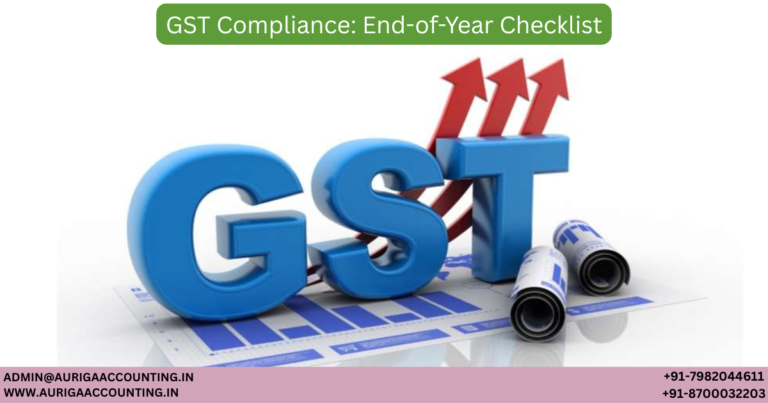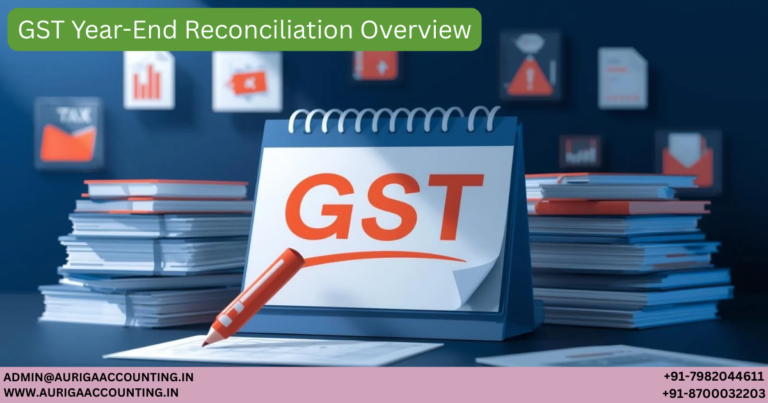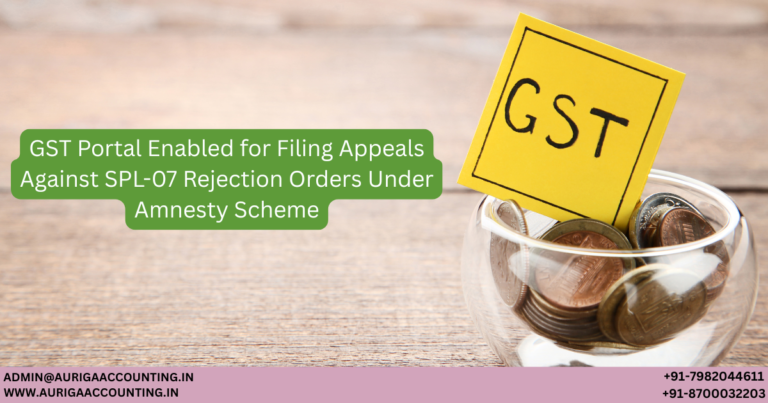Rohan is an expert writer skilled at transforming complex legal concepts into straightforward, practical guidance. Her articles equip entrepreneurs with the essential knowledge to confidently navigate business laws, helping them launch and manage their ventures successfully.

GST on Labour Charges: Check HSN Code and GST Rates
Introduction
ToggleThe Goods and Services Tax (GST) has simplified India’s indirect tax system by introducing a unified framework for taxing goods and services. Labour charges—an essential cost component across various sectors—are subject to GST depending on the type of service rendered. This article offers a comprehensive overview of the applicable GST rates on labour charges, relevant HSN codes, and key compliance guidelines.
What is a Labour Contract?
A labour contract is a legally binding agreement between an employer and an individual worker or a group of workers. It outlines the terms and conditions under which the labour or services will be provided. This contract defines the scope of work, along with the rights, duties, and responsibilities of both parties involved.
Depending on the type of work and the nature of services rendered, labour contracts may be subject to GST under current tax regulations
Types of Labour Contracts Under GST
Labour contracts can broadly be classified into two categories based on whether materials are involved along with labour services:
1. Pure Labour Contract
A pure labour contract involves only the supply of labour without any materials. Under GST, such contracts are considered as pure labour services and may qualify for exemption when provided for specific purposes such as:
Government-approved affordable housing projects
Agricultural operations
Public welfare schemes
Examples:
Painting services where the client supplies all materials (e.g., paint)
Masonry work where construction materials are provided entirely by the builder
2. Labour Contract Including Materials (Works Contract)
When a labour contract includes both labour and materials, it falls under the definition of a works contract as per Section 2(119) of the CGST Act, 2017.
Key features:
It is treated as a composite supply involving both goods and services
The labour/service component is considered the principal supply
Generally, GST is applicable at 18%, unless specifically exempt (e.g., construction under affordable housing schemes)
Examples:
Construction of a building where the contractor supplies materials such as cement and bricks along with labour
Interior design services that include both labour and supply/installation of furniture
Labour Charges: Pre-GST vs. Post-GST Comparison
Before the implementation of the Goods and Services Tax (GST), labour charges were subject to a complex tax structure involving multiple levies such as excise duty, VAT, and service tax. The rollout of GST introduced a unified tax framework, replacing these with a single tax and streamlining compliance. The table below illustrates a cost comparison for labour charges before and after GST:
| Particulars | Pre-GST (₹) | Post-GST (₹) |
|---|---|---|
| Total Cost (Materials + Labour) (A) | 100 | 100 |
| Excise Duty @ 12.5% (B) | 12.5 | – |
| Service Tax @ 15% on 40% of (A) (C) | 6 | – |
| VAT @ 5% on (A) (D) | 5 | – |
| GST @ 18% on (A) (E) | – | 18 |
| Total Sale Consideration (A+B+C+D+E) | 123.5 | 118 |
Key Insights:
Reduced Effective Tax Burden:
Under the GST regime, the total sale consideration has decreased from ₹123.5 (Pre-GST) to ₹118 (Post-GST), reflecting a lower effective tax impact on the end customer.Simplified Tax Structure:
Multiple indirect taxes such as excise duty, VAT, and service tax have been consolidated into a single GST rate of 18%, applicable to the total contract value.Input Tax Credit (ITC) Benefit:
Post-GST, businesses are eligible to claim ITC on inputs and raw materials, leading to a further reduction in the overall tax liability
Applicability of GST on Labour Charges
GST is applicable to labour contracts when the service provider is registered under the GST regime. The following points outline the key aspects of its applicability:
1. GST Registration Requirement
Mandatory Registration:
Businesses or contractors with an annual turnover exceeding ₹20 lakh (₹10 lakh in special category states) are required to register under GST.Post-Registration Benefits:
Once registered, contractors are legally authorised to charge GST on their services and can also claim Input Tax Credit (ITC) on eligible purchases and inputs used in providing the service.
2. When the Service Provider is Registered
A registered contractor must:
Charge GST on labour services
Issue GST-compliant invoices
File appropriate GST returns
3. When the Service Provider is Unregistered
If the contractor is not registered under GST, the liability to pay GST shifts to the service recipient through the Reverse Charge Mechanism (RCM).
In such cases, the recipient:
Must pay GST on behalf of the contractor
Can claim ITC on the GST paid, provided all other conditions under GST law are fulfilled
Determining the Value of Supply for GST on Labour Charges
The value of supply for calculating GST on labour charges includes all costs—both direct and indirect—related to the execution of the labour contract. This comprehensive approach ensures full compliance with GST provisions.
Components Included in the Value of Supply:
Labour Charges:
The base cost of the labour service rendered.Service Fees:
Additional charges such as administrative, coordination, or overhead costs levied by the contractor.Statutory Contributions:
Payments made on behalf of the contractor, such as:EPF (Employee Provident Fund)
ESI (Employee State Insurance)
If these are paid by the service recipient on the contractor’s behalf, they must be included in the taxable value
How is GST on Labour Charges Calculated?
GST is calculated on the transaction value, which represents the total amount payable for the service. It includes:
All fees and expenses related to the service
Charges paid under other laws (except CGST, SGST, IGST)
Amounts borne by the recipient on behalf of the supplier
Illustrative Example:
Let’s assume a labour supplier (X) provides services to a company (Y), and the following components apply:
| Particulars | Amount (₹) |
|---|---|
| Base labour charges | 200 |
| Service fee @ 10% | 20 |
| EPF paid by contractor (X) | 24 |
| ESI paid by contractor (X) | 9.5 |
| Total value of supply | ₹253.5 |
| GST @ 18% on ₹253.5 | ₹45.63 |
Total Invoice Amount: ₹253.5 + ₹45.63 = ₹299.13
Key Takeaway:
The GST is levied on the full value of supply, which includes all service charges and any statutory payments covered by the recipient. This ensures accurate tax computation and avoids non-compliance
GST on Manpower Supply Services
Manpower supply services such as drivers, data entry operators, clerical staff, security personnel, and housekeeping staff are taxable at 18% GST. This rate applies uniformly, whether the services are rendered to private businesses, individuals, or government bodies
GST on Manpower Services to Government Entities
When manpower services are provided to the Central Government, State Governments, or any government department, they are also subject to 18% GST. These services are not exempt simply because the recipient is a government entity—they are treated the same as services provided to the private sector unless specific exemptions apply
Exemptions under Articles 243G and 243W
Manpower services may be exempt from GST if they are used for functions assigned to Panchayats or Municipalities under the Indian Constitution, specifically:
Article 243G – Functions of Panchayats
Article 243W – Functions of Municipalities
To qualify for exemption, the manpower services must be directly related to activities covered under these constitutional provisions.
Examples of Exempt Manpower Services:
Solid Waste Management:
Drivers and sanitation workers engaged by Municipal Corporations or Zilla Parishads.Social Welfare Institutions:
Staff such as cleaners, cooks, watchmen, teachers, and nurses employed in anganwadis, government-run hostels, or residential schools managed by departments like Social Welfare or Education.
Key Takeaways:
Standard GST Rate: 18% for all manpower supply services.
No Automatic Exemption for Government Clients: GST applies unless the service is specifically for constitutional functions of local self-governments.
Eligible Exemptions: Only apply to manpower services linked to municipal or panchayat-level public functions, such as sanitation, health, or education
HSN Codes and GST Rates for Labour Charges
Labour charges fall under different HSN (Harmonised System of Nomenclature) codes based on the specific nature of the service provided. Below is a summary of the most commonly used HSN codes along with their applicable GST rates:
| HSN Code | Type of Labour Service | GST Rate |
|---|---|---|
| 998511 | Executive or retained personnel search services | 18% |
| 998512 | Permanent placement services | 18% |
| 998513 | Contract staffing services | 18% |
| 998515 | Long-term staffing/payroll services | 18% |
| 998516 | Temporary-to-permanent staffing services | 18% |
| 998517 | Co-employment staffing services | 18% |
Important Considerations
Pure Labour Contracts:
If a contract involves only the provision of labour without any material component, it is treated as a pure labour contract. GST is charged based on the relevant HSN code and service type.Works Contracts:
When both labour and materials are supplied together, it constitutes a works contract. This is treated as a composite supply under GST and taxed at 18%, unless exempt under specific schemes (e.g., affordable housing).
Exemptions for Labour Services
Labour services are exempt from GST if they are directly related to the functions entrusted to Panchayats or Municipalities under Articles 243G and 243W of the Constitution of India.
Examples of Exempted Activities:
Waste collection and management by local bodies
Services provided in anganwadis or government hostels and schools
GST Implications for Imported Labour Services
When Labour Contractor is GST-Registered:
If the agency or contractor supplying labour is registered under GST, they must charge GST on the service. The recipient can claim Input Tax Credit (ITC) on the GST paid, subject to eligibility and documentation compliance.When Labour Contractor is Not GST-Registered:
If the labour supplier is unregistered, the recipient of the service is liable to pay GST under the Reverse Charge Mechanism (RCM). The recipient can still claim ITC, provided all applicable GST conditions are fulfilled
Exemptions on Labour Charges
Certain pure labour contract services are exempt from GST under Notification No. 12/2017, dated 28th June 2017. The key exemptions include:
Construction or Installation of Original Works for Single Residential Units:
Labour services related to the construction, erection, commissioning, or installation of original works for a single residential unit (not part of a residential complex) are exempt from GST.Labour Services under Government Housing Schemes:
Labour charges for construction, erection, commissioning, installation, completion, fitting out, repair, maintenance, renovation, or alteration of civil structures or original works under specific government programs are exempt. These include:Beneficiary-led individual house construction or improvement under the Housing for All (Urban) Mission
Projects under the Pradhan Mantri Awas Yojana (PMAY)
Important Conditions for Exemption
The exemption does not apply if the supplier provides the entire construction service, including both materials and labour (i.e., a works contract).
The exemption is not valid if the construction involves multiple residential units as part of a larger housing project
About the Author
Rohan
March 2, 2026
new
January 8, 2026
January 8, 2026
January 6, 2026
January 2, 2026
January 2, 2026
December 31, 2025
December 29, 2025
December 29, 2025
December 29, 2025
December 27, 2025
December 27, 2025
December 26, 2025
December 16, 2025
December 13, 2025
November 27, 2025
November 27, 2025
November 26, 2025
November 25, 2025
November 21, 2025
November 20, 2025
November 20, 2025
November 20, 2025
June 16, 2025
June 13, 2025
June 11, 2025
June 9, 2025
June 5, 2025
June 5, 2025
June 5, 2025
June 5, 2025
June 4, 2025
June 4, 2025
June 3, 2025
June 3, 2025
May 31, 2025
May 31, 2025
May 30, 2025
May 30, 2025
May 30, 2025
May 29, 2025
May 29, 2025
May 29, 2025
May 29, 2025
May 28, 2025
May 28, 2025
May 27, 2025
May 24, 2025
May 23, 2025
May 22, 2025
February 1, 2024
September 7, 2023
September 7, 2023
September 6, 2023
September 6, 2023
September 5, 2023
September 5, 2023
September 5, 2023
September 5, 2023
September 4, 2023
September 4, 2023
September 4, 2023
September 4, 2023
September 1, 2023
September 1, 2023
September 1, 2023
September 1, 2023
August 30, 2023
August 30, 2023
August 30, 2023
August 29, 2023
August 29, 2023
August 29, 2023
August 29, 2023
August 28, 2023
August 28, 2023
August 28, 2023
August 28, 2023
August 28, 2023
August 26, 2023
August 26, 2023
August 26, 2023
August 26, 2023
August 25, 2023
August 25, 2023
August 25, 2023
August 25, 2023
August 24, 2023
August 24, 2023
August 24, 2023
August 24, 2023
August 22, 2023
August 22, 2023
August 22, 2023
August 22, 2023
August 22, 2023
August 21, 2023
August 21, 2023
August 21, 2023
August 21, 2023
RELATED ARTICLES
GST Compliance:...
GST Year-End...
Use a Virtual...
Auto-Populated...
No posts found












